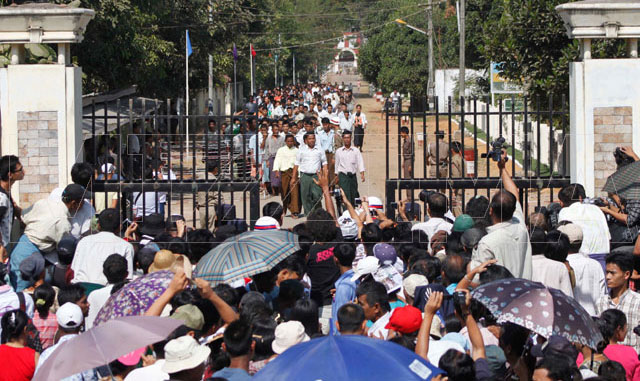Up to 20 Burmese political prisoners are included in an amnesty of 46 prisoners on Tuesday, democracy activists said.
 The 88-Generation Students Group, whose key members were at the forefront of a 1988 uprising, said political inmates are included in the release.
The 88-Generation Students Group, whose key members were at the forefront of a 1988 uprising, said political inmates are included in the release.
"We received confirmation about 20 political prisoners are part of today's amnesty," 88-Generation student leader Kaung Kaung told Agence France Press.
A group member, Ko Ko Gyi, himself a former political prisoner, said former student activist Aye Aung, who was serving a 59-year sentence for distributing pamphlets and taking part in a protest during a 1998 pro-democracy uprising, was among those released.
"We are very happy that our fellow political prisoners are being released," Ko Ko Gyi told The Associated Press. "However, we will continue to work for the release of all political prisoners."
Aung San Suu Kyi, at a news conference in Rangoon on Tuesday, said the government should immediately free all political prisoners and according to her party’s estimates there are 330 political prisoners still behind bars, although estimates on the exact number vary.
The New Light of Myanmar, the official state-run newspaper, said 37 men and nine women would be set free.
The amnesty decision was made "with a view to ensuring the stability of the State and making eternal peace, national reconciliation, enabling all to participate in political process," said the newspaper.
It came shortly after a Burmese minister while visiting Norway said that further amnesties for jailed dissidents would occur.
More than 650 political prisoners were freed between May 2011 and January 2012, according to Amnesty International. Among those released were celebrated dissidents such as Min Ko Naing and Monk Gambira, jailed for their role in a 2007 democracy protest led by Buddhist monks.
Zarganar, an actor and democracy activist who was once imprisoned himself, told Reuters news agency in June that any releases will happen slowly, because government officials are still reluctant to admit political prisoners even exist.
"They call them criminal cases," Zarganar was quoted as saying. "I tell them, 'Water is still water, whatever you call it. Please release them. That's all.'"
The exact number of political prisoners still in jail is unknown. A list Zarganar submitted to the president's office in May contained 345 names. The Assistance Association for Political Prisoners – Burma places the number at 471, and says it is investigating another 466 cases.
Rights groups say between 200 and 600 political prisoners remain behind bars. The government is not transparent in regard to the number of political prisoners it holds. It refuses to acknowledge the term political prisoners, saying all prisoners have been convicted of breaking existing laws.


